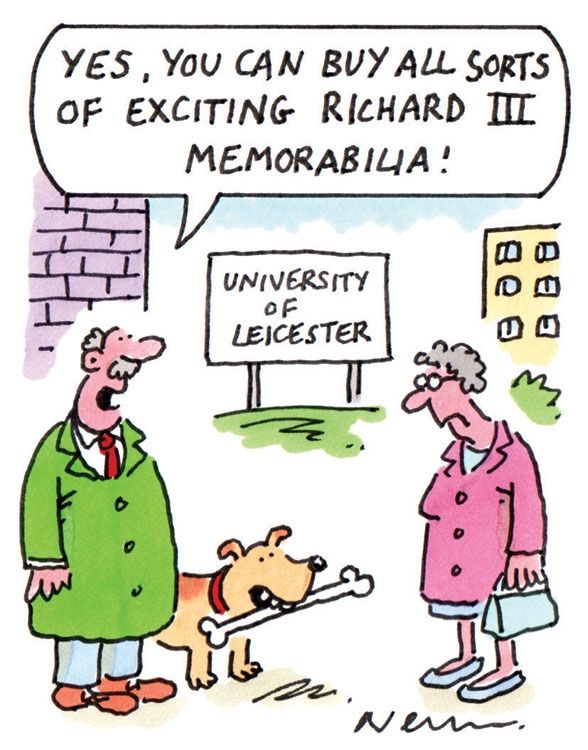
- Medical students are renowned for their antics, but stuffing the remains of a walrus into a coffin would seem extreme even for them. But this could be a possible explanation for the puzzling discovery of bones below St Pancras International belonging to a 4m-long Pacific walrus. The Times reported on 23 July that scientists were stumped as to how the creature, which usually migrates between the Bering and Chukchi seas, found its way to London in the early 19th century. As the bones were discovered near human remains that showed signs of dissection, one theory is that the walrus could have been sold for medical research. But given that it was placed in a coffin, could it also have some connection to Lewis Carroll’s 1871 poem The Walrus and the Carpenter – which, in turn, helped to inspire John Lennon’s ode to the blubbery sea beast? Goo goo g’joob.
- One of the difficulties of catching internet “trolls” – people who set out to deliberately antagonise, wind up, threaten or insult others online – is the anonymity that the web can afford. However, this was not a problem for anyone wishing to identify the origin of a tweet sent to University of Cambridge professor Mary Beard containing a string of crude insults. The tweet was sent from the personal, named account of Oliver Eric Rawlings, a University of Nottingham student, and was promptly seen by a family acquaintance who offered to give Professor Beard the address of his mother. Professor Beard granted young Oliver the chance to say sorry first. His next tweet? “I sincerely apologise for my trolling. I was wrong and very rude. Hope this can be forgotten and forgiven xxx.” Beard one, Troll nil.
- Noisy undergraduates at the British Library have made headlines again after a flurry of letters on the issue in the London Review of Books. Although the library reduced the admission age to 18 in 2004, the increased use of smartphones and tablets and the conspicuous flirting have now become unbearable for its older users: one complained that the London library is “swamped with intruders”. But in The Times on 26 July, Ben Macintyre argued that the enlivening of the institution’s reading room, used in the past by, among others, Lenin, Marx and Gandhi, was a good thing because it upheld its commitment to welcoming the “curious…from every corner of humanity…So, far from regretting [the] change, we should trumpet it – although not, obviously, where people are trying to read.”
- Are new universities unfairly cashing in on the £9,000 fee regime? One vice-chancellor at a Russell Group institution thinks so, claiming in The Times that post-1992 universities get double funding for their disadvantaged undergraduates. In a piece on July, the unnamed leader said traditional universities were losing out because they had to spend a larger chunk of their fee income on fair access than new institutions, but received hardly any money from the £3 million student opportunity fund given mostly to those with high numbers of disadvantaged students: effectively, new universities were “double dipping” on access funds. “Which universities need the money? It is the ones that do research,” the head argued. Some may see the snipe as a shot across the bows of Madeleine Atkins, the next head of England’s funding council and vice-chancellor of Coventry University, which will receive £4.6 million in student opportunity funding this year.
- The Independent’s Archie Bland finally snapped after yet another Richard III story found its way into the paper’s news pages. A second skeleton had been found in two coffins in the same Leicester car park as the Plantagenet king, which Mr Bland felt was “yet another nail in a very thoroughly hammered coffin” of a once-exciting story. But Mr Bland noted on 29 July that the Richard III industry has only just begun, with the University of Leicester’s press office homepage advertising a Richard III internship, a Richard III family open day and a range of Richard III T-shirts, mugs, badges and notebooks. “You can’t blame the PR bods, tenacious as they are, for putting such drivel out into the world,” he wrote. “The embarrassment sits with those of us in the media, for eating it up with such enthusiasm.”
Register to continue
Why register?
- Registration is free and only takes a moment
- Once registered, you can read 3 articles a month
- Sign up for our newsletter
Subscribe
Or subscribe for unlimited access to:
- Unlimited access to news, views, insights & reviews
- Digital editions
- Digital access to THE’s university and college rankings analysis
Already registered or a current subscriber? Login